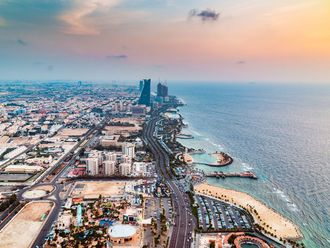Uzbekistan called yesterday for foreign investment to develop its potentially huge oil and gas reserves, but major foreign firms so far seem unwilling to commit serious cash to the Central Asian state.
The Uzbek government used an annual energy conference to announce the formal launch of a privatisation programme for state energy holding company Uzbekneftegaz. But while the former Soviet republic has large reserves of oil and, especially, gas, it is lagging far behind other newly independent states in the Caspian basin, such as Azerbaijan and Kazakhstan, in attracting investment.
Last year Uzbekistan produced 150,000 barrels per day of crude and 56.4 billion cubic metres of natural gas. Reserves are estimated at over 30 billion barrels of oil and 5.4 trilliion cubic metres of gas.
"Uzbekistan has mutually advantageous terms for investment which will give a new impact for its integration into the world economy," Valery Atayev, a deputy prime minister and head of Uzbekneftegaz, told the conference.
After years of lagging its neighbours in opening its economy, Uzbekistan tried to catch up in April 2000, when President Islam Karimov signed a decree "on measures to attract direct foreign investment in exploration and production of oil and gas."
This gives some important tax concessions and guarantees, but so far few foreign companies have rushed to put money into the country. Indeed only one, UK-based Trinity Energy, has signed a Production Sharing Agreement, between wholly-owned Trinity subsidiary UzPEC Ltd and Uzbekneftegaz. The agreement was signed on April 27.
"This progressive form of cooperation, the first in Uzbekistan's history, could be a blueprint for the future," Uktam Ismailov, chairman of the state property committee, said. Larry Bates, head of UzPEC's representation in Uzbekistan, said the company was satisfied Uzbekistan had established a stable investment climate.
But Gavin Graham, regional vice-president for Central Asia of Shell International Ventures BV, said that although the climate was improving, difficulties remained. "Commercial opportunities must exist to do business - there must be oil and gas supplies and there must be markets," he said.
He added that legal, political and fiscal stability were all essential, as was a government commitment to a "win-win situation." But perhaps Uzbekistan's biggest hurdle to attracting foreign investment is its geographical isolation.
While the whole of the Caspian basin is far from open markets, making pipelines essential, oil and gas from Uzbekistan must cross even more borders than energy from other countries to get to a point of sale.
"There will be hard currency markets for gas from Central Asia in Western Europe and in China, but they will only be available for new contracts from 2008 to 2010," Graham said. "The Turkish market is oversupplied - over half the world's gas resources are targetting Turkey.
So for the next five years Central Asian gas will have to target regional markets," mainly meaning Russia and Kazakhstan, he said. While he added that these countries were increasingly beginning to pay on time and in dollars for energy, doubts must remain as to whether oil majors will want to make significant investments in Uzbekistan until market access improves.
Isolated Uzbekistan struggles to attract investors
Uzbekistan called yesterday for foreign investment to develop its potentially huge oil and gas reserves, but major foreign firms so far seem unwilling to commit serious cash to the Central Asian state.












